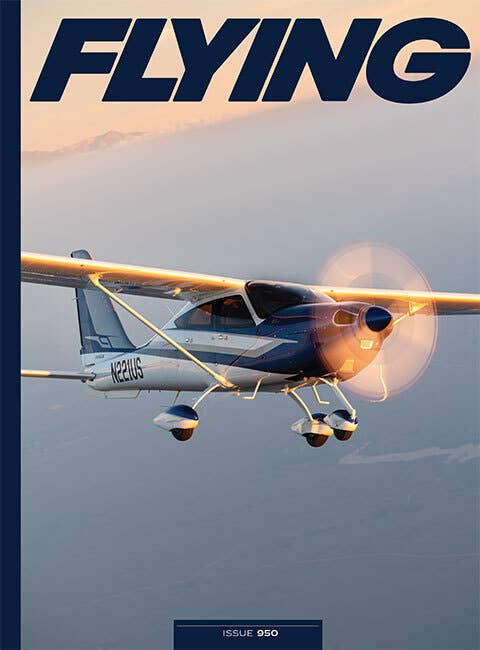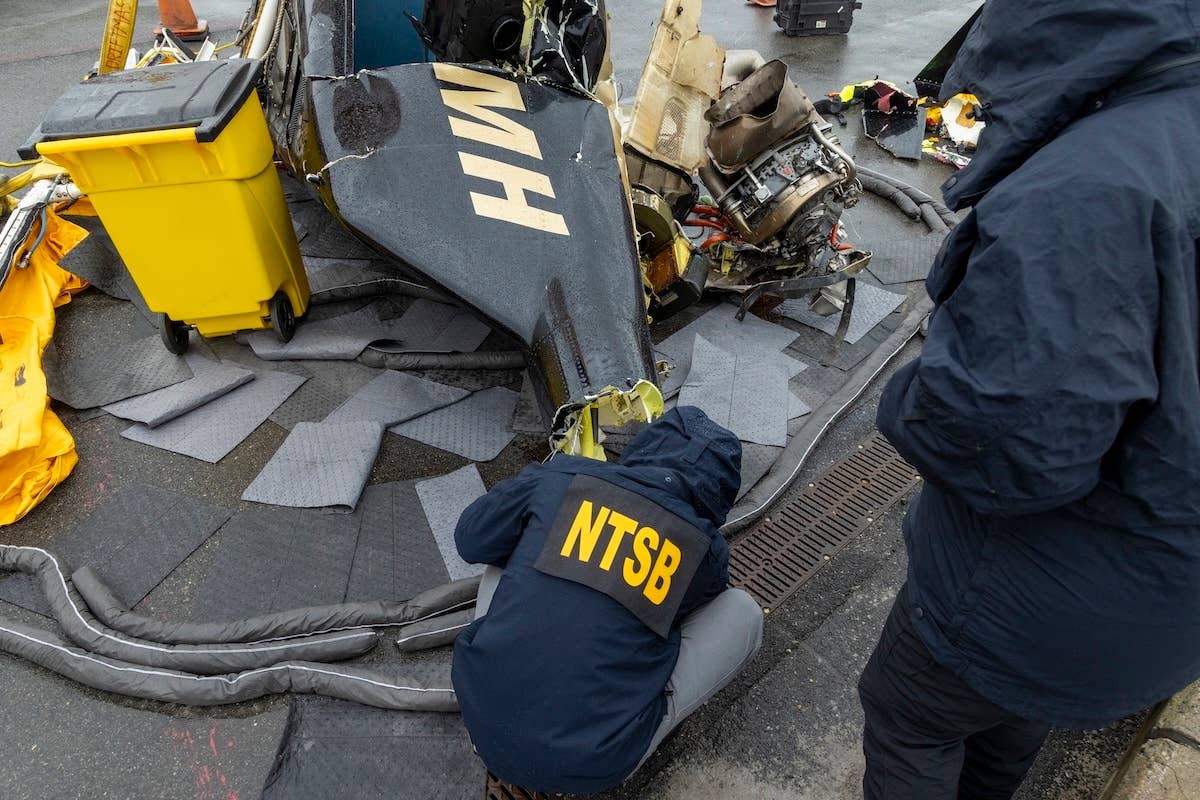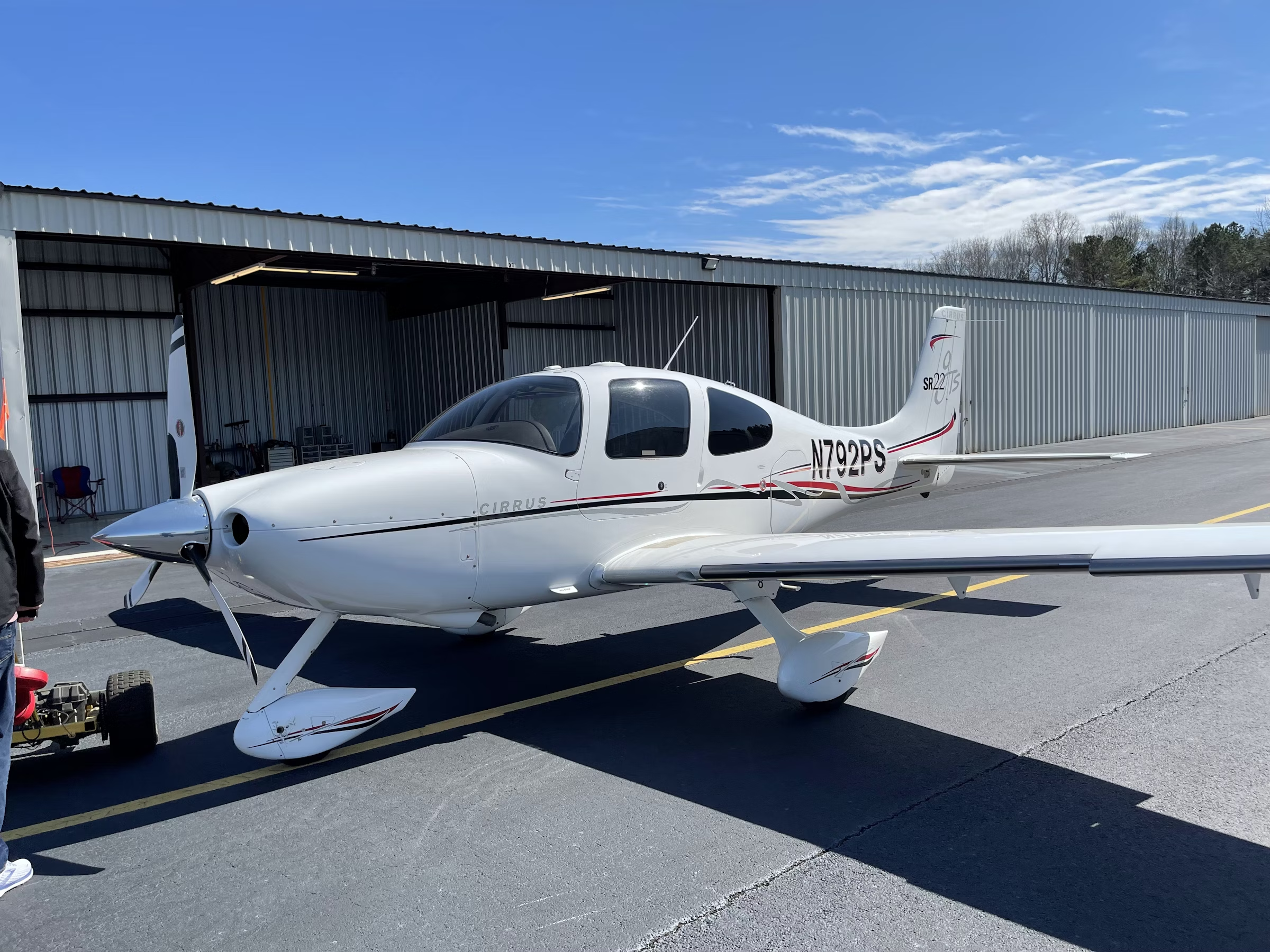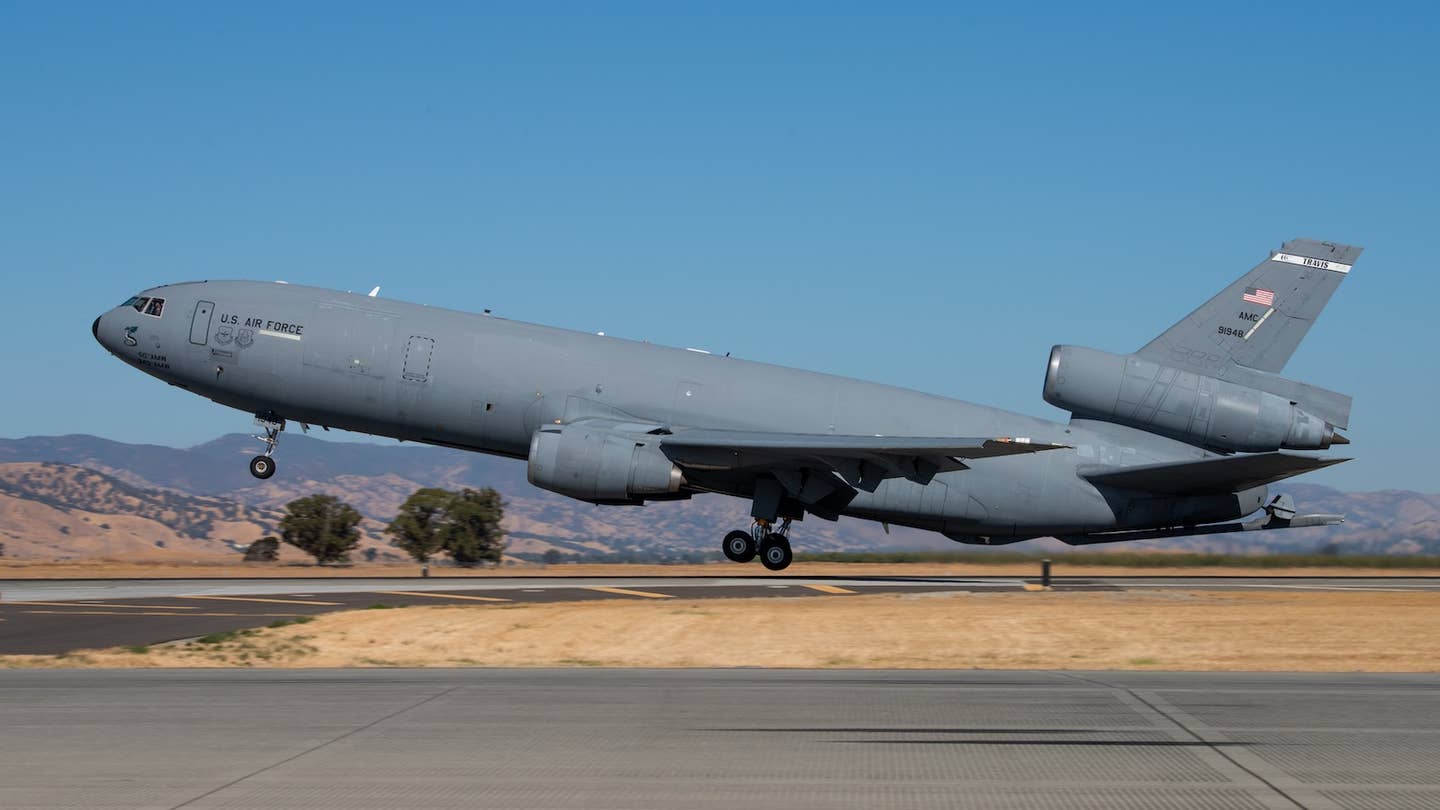Tempest Aero Group Remains True Friend to General Aviation
Aircraft parts manufacturer Tempest Aero Group supplies more to the general aviation world than you may think.
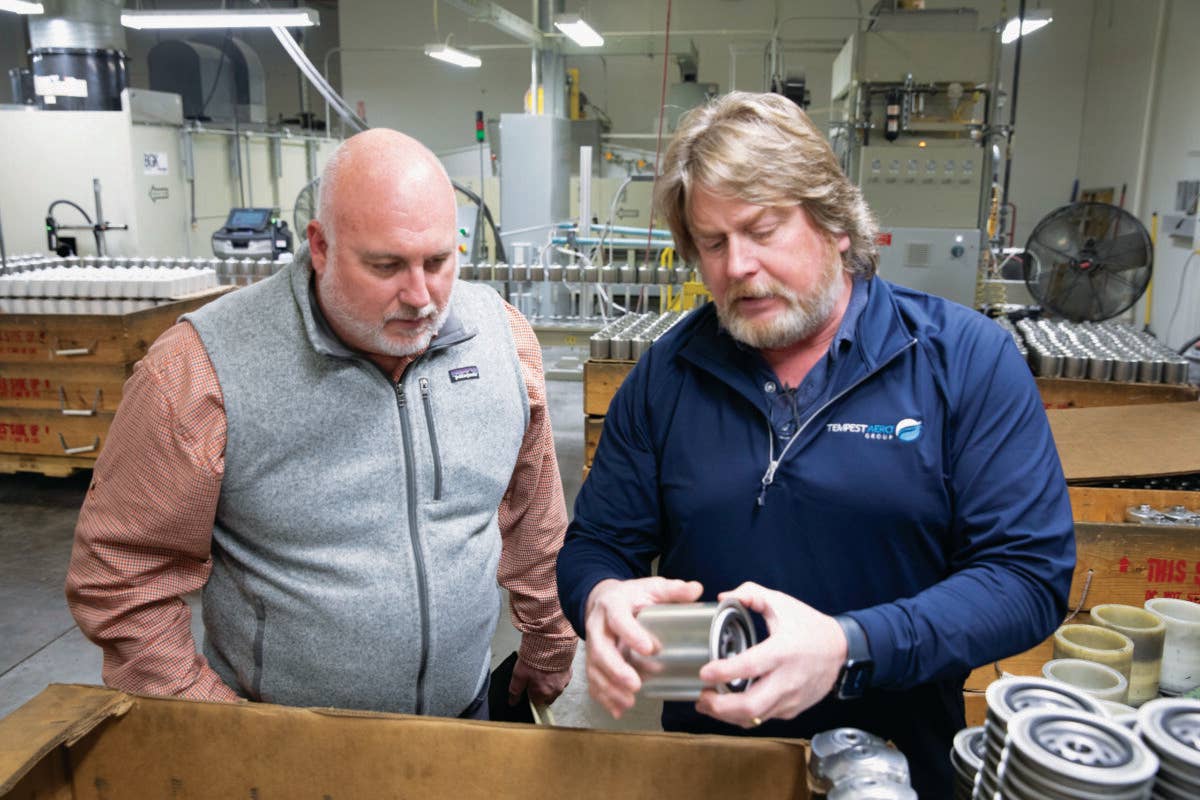
FLYING writer Richard Scarbrough (left) and Tempest Aero Group CEO Mike Allen take a look at the housing for one of the company’s spin-on oil filters. [Courtesy: Tempest Aero Group]
On a hill up and off the road, tucked neatly behind the trees, sits an unassuming building that gives a minimal indication of what happens beyond the front door. Here, the employees of Tempest Aero Group quietly go about their day, moving parts down the line and paying keen attention to detail. They may chat about their kids’ ball practice, share a recipe, or work quietly by themselves. These tasks may seem mundane to some, but their demeanor displays unspoken confidence. What they accomplish in Burlington, North Carolina, will propel their brand to the top of the charts. Look closely enough, and you will see Tempest Aero Group is quietly taking aviation by storm.
If you're not already a subscriber, what are you waiting for? Subscribe today to get the issue as soon as it is released in either Print or Digital formats.
Subscribe NowWho Is Tempest Aero Group?
One of the first indications of a storm brewing is an abrupt change in the wind. An updraft of air may force a cumulus cloud upward, disrupting the atmosphere—and then watch out. Those not paying attention could soon be exposed and hear the crack of thunder that could spell trouble. I could not think of a better metaphor for this story. In 1984, the major players in GA manufacturing were entrenched and had enjoyed a near monopoly on aircraft parts and accessories for decades.
A high barrier to entry tends to protect those at the top. In Gibsonville, Tim Henderson was setting up shop as a Part 145 certified repair station focused on accessories. His company, Aero Accessories, began working with alternative maintenance practices, such as repair process specifications, and eventually produced its first parts manufacturer approval (PMA) part—contact points for magnetos.
Branding is essential in a crowded market to differentiate from the competition. In 2001, Henderson partnered with Stan Fletcher, and in 2003, they signed on John Herman, vice president of sales and marketing, and got to work on a new plan. Aero Accessories had a good name in the industry. The name itself, however, was not unique. What term best describes what they planned to do? Tempest was born.
Not much had changed since 1984, and the Tempest team faced a slow climb. It was tough to gain momentum in the aftermarket. The team first focused on FBOs but saw only small gains. Realizing that growth would happen with brand recognition, Herman and Fletcher began to market directly to the aircraft owners/operators. Once they won the hearts and minds of the end users, sales took flight and showed no signs of landing anytime soon. In my engine shop days, we used Tempest products and always experienced good luck with them, so when Herman invited me to visit the factory making the parts, I accepted. Early one Monday morning, we flew into the Piedmont Triad International Airport (KGSO) in Greensboro and took a short drive over to the shop. Herman ushered me to a conference room, where I met Tempest CEO Mike Allen.
Not far from the place Aero Accessories began sits the heart of Tempest’s business—a fully operational machine shop. The company’s roots are in engineering and solving some of the most challenging problems in GA. The machine shop takes this further and allows the leadership to control the quality, logistics, and output of the finished product. Remember in mid-2021 when ships could not reach the shore and offload material? Subcomponents of aircraft parts were stuck floating in containers, directly impacting the ability to produce finished goods. Unlike small businesses, major corporations procure components and assemble them in house. Doing so puts them at risk for work stoppage resulting from logistics issues. Because Tempest machines its housings, levers, shafts, and so on in house, it is more insulated from supply chain disruptions.
Another benefit is quality control. When an inspector discovers a flaw, they can quickly discard it and send a new order down the street for a remake. Try doing that with a supplier overseas. Tempest is not immune to supply chain issues, though. It sometimes has trouble getting raw materials—such as copper for gaskets—and faces iridium price spikes. However, being small and nimble allows the company to shift with the market as needed.
We talked briefly about the impact of COVID-19 and the trying time everyone in business experienced. I knew firsthand the pandemic’s effects on airlines and distribution but was curious about manufacturing. First-tier manufacturers Boeing and Airbus went from running over capacity to dead in the water overnight. At Tempest, orders slowed in March 2020, and the team used this time to clear the backlog of both OEM-new and Part 145-repaired work. Later that spring, the ordering started again and steadily increased every quarter. Flight training is now booming, and flight schools consume a significant percentage of Tempest’s products. The sales cycle for distributors is 30 to 45 days, an excellent turn of inventory for the distribution partners.
The ‘Original’ Oil Filter
Tempest Aero Group owns an arsenal of iconic aerospace brands, including the original products marketed under the Tempest name. In 2003, Champion dominated the aftermarket, and there was a long tail of “other” products. In 2004, Tempest entered the market, and though sales began slowly, the team persevered. Looking back, it must have seemed daunting to go up against an industry leader like Champion.
I started my engine shop in 2005, and oil filters marked the beginning of my relationship with Tempest. I distinctly remember the word “original” stamped on the white metal cans. When Tempest started manufacturing, it did so on the original equipment procured from the OEM. A rumor once circulated that the Kelly Aerospace PMA oil filter didn’t sell because it was red. Tempest stuck with white and now owns a substantial share of the aftermarket. One benefit of white housings? The ability to check for oil leaks.
Tempest now holds most of the aftermarket business in oil filters, and in 2013 it became the OEM’s choice for Continental Motors. Partnering with Continental allowed Tempest to collaborate to develop the Spin EZ oil filter. This proprietary design allows for easier removal of the oil filter; the feature represents just one of many improvements over traditional designs. Stratus Tool Technologies specializes in oil filter adapters and specialty tools. For those following my Cessna 172 series online, we recently received an adapter for a Continental O-300-D. We are planning an upcoming maintenance visit to install it, so stay tuned. Air filters are also vital to engine health and performance, and Tempest AeroGuard induction air filters set high standards for newer technology as well.
Components were another element of my business at the engine shop. Dry air pumps become part of the work scope if installed on the engine upon receipt. Legacy operators will recall the OEM Airborne stamping “no overhaul” on the housings of the vacuum pumps. Tempest countered this by placing “returnable core” stickers over the casting. What better way to be sustainable than reuse? Airborne wanted to sell new pumps and tried to corner the market. Preserving existing products and introducing a new vacuum pump PMA helped Tempest in the early 2000s.
Fast-forward to 2023, and overhaul work constitutes almost two-thirds of Tempest’s business. It makes perfect sense to overhaul instead of tossing an aircraft part into the landfill. Housings rarely scrap out. The focus is on the inner rotating parts. Vacuum pump vanes are matched in a set and lapped to establish uniformity, allowing for a longer-life pump. Precision is paramount to performance as the rotor spins at 1.5 engine revolutions per minute, equating to 4,500 rpm. Coming full circle, Tempest is now the OEM on dry air pumps in yet another instance of the disruptor unseating the incumbent and making it to the top.
A Better Spark Plug
They say all good ideas start with a spark. Well, so do piston aircraft engines. In January 2010, Tempest announced the acquisition of Autolite spark plugs from Unison Industries. This move signaled a new area of growth for the Tempest team. Manufacturing relocated to North Carolina, and the company began shipping plugs in the spring of that year. Once again, the Tempest team sought to compete with Champion by producing a high-quality product. GA aircraft utilize two styles of spark plugs—fine wire and massive electrode. Fine wire plugs offer a more efficient burn rate and last longer at a much higher purchase price. A relatively small niche market, they represent about 10 percent to 15 percent of the aviation aftermarket. Turbocharged aircraft flying at higher altitudes favor fine wire plugs. As with its oil filters, Tempest began as a disruptor and has become the industry leader. It boasts over half of the entire GA plug business. Each plug is still manufactured in North Carolina and delivered through the distributor network.
- READ MORE: Intro to Aviation Spark Plugs
Tempest also carries a line of mechanical fuel pumps, ranging from the simple Lycoming diaphragm style to the more complex Continental and RayJay applications with its affiliate company, Consolidated Fuel Systems. As for other lines, Tempest started with its own products, rebranded from the Aero Accessories name. The company then expanded by acquiring other companies. One such acquisition was Alcor, a leading temperature probes and instruments company in San Antonio. Another Tempest entity providing fuel systems to GA is Precision Airmotive in Arlington, Washington. For years, its RSA Servos have been instantly recognizable under the cowling of any aircraft. Now Precision Airmotive markets the Silver Hawk EX for experimental applications.
Another name that stands out from the rest is Marvel-Schebler Aircraft Carburetors. In 2007, the legacy carburetor company was bankrupt and threatened to shut its doors for good. Industry leaders approached Tempest and asked for help, which agreed but opted for a new name—Volare, Latin for “to fly.” This deal was Tempest’s first significant acquisition, essentially setting the stage for growth. However, the industry embraced the new owners but not the name. Thankfully, nostalgia won, and Tempest restored the Marvel-Schebler name.
Brand loyalty is vital in aerospace, and Tempest has generally earned its reputation as delivering quality products. Brand ambassadors, such as Quality Aircraft Accessories, tout the positive attributes of Tempest and even host Tech Tips covering various topics. One such article delves into the care and maintenance of spark plugs. Tempest relies on its distributor network of shops and resellers to be its boots on the ground and gathers intel for product performance and potential enhancements.
X Factor
The Oxford Dictionary states that an X factor is “a variable in a given situation that could have the most significant impact on the outcome.” Tempest has its own X factor—its people. I met these folks when I toured the factory in North Carolina, and it had me recalling my ownership days and remembering the struggle to attract and retain quality talent. Tempest felt that challenge in recent years, but recruitment is improving. These are real aviation folks, not just workers filling the positions. There is little turnover at all at the Tempest-branded companies. During my walk through the vacuum pump shop, I met folks like Richard. He has been here for 36 years, almost as long as the company has been in existence. Richard and his colleagues are the source of Tempest’s strength.
When the company was getting things off the ground, Mike Allen would fly a Cessna 310 to visit customers and remote facilities, such as Alcor in Texas. They now fly a Cessna 441 Conquest II. It is one thing to talk about utilizing GA for business, but operating an aircraft and being able to take off at a moment’s notice is another. Vince Bechtel, director of aftermarket sales, travels extensively, giving lectures and tech talks on Tempest products and solutions. Look for Bechtel next time you attend an inspection authorization (IA) renewal.
I asked Herman and Allen what drives them to build this brand. They both said the team. Companies can do great things when everyone pulls in the same direction. This attitude flows down through the other managers and customer services. Take care of the employees, and they will take care of the customers.
Tempest Aero Group seeks to expand its portfolio, and small businesses need investors to fund research and development. On April 4, the company announced an investment partnership with Vance Street Capital. Securing this funding will allow Tempest to explore new opportunities in years to come. With an eye on the horizon, the Tempest Aero Group’s leadership continues to push the company forward. It is not just selling products made in America by a dedicated workforce. Tempest gives you the freedom to own and operate a GA aircraft economically—TSA pat-down not included.
This article first appeared in the August 2023/Issue 940 of FLYING's print edition.

Sign-up for newsletters & special offers!
Get the latest FLYING stories & special offers delivered directly to your inbox

